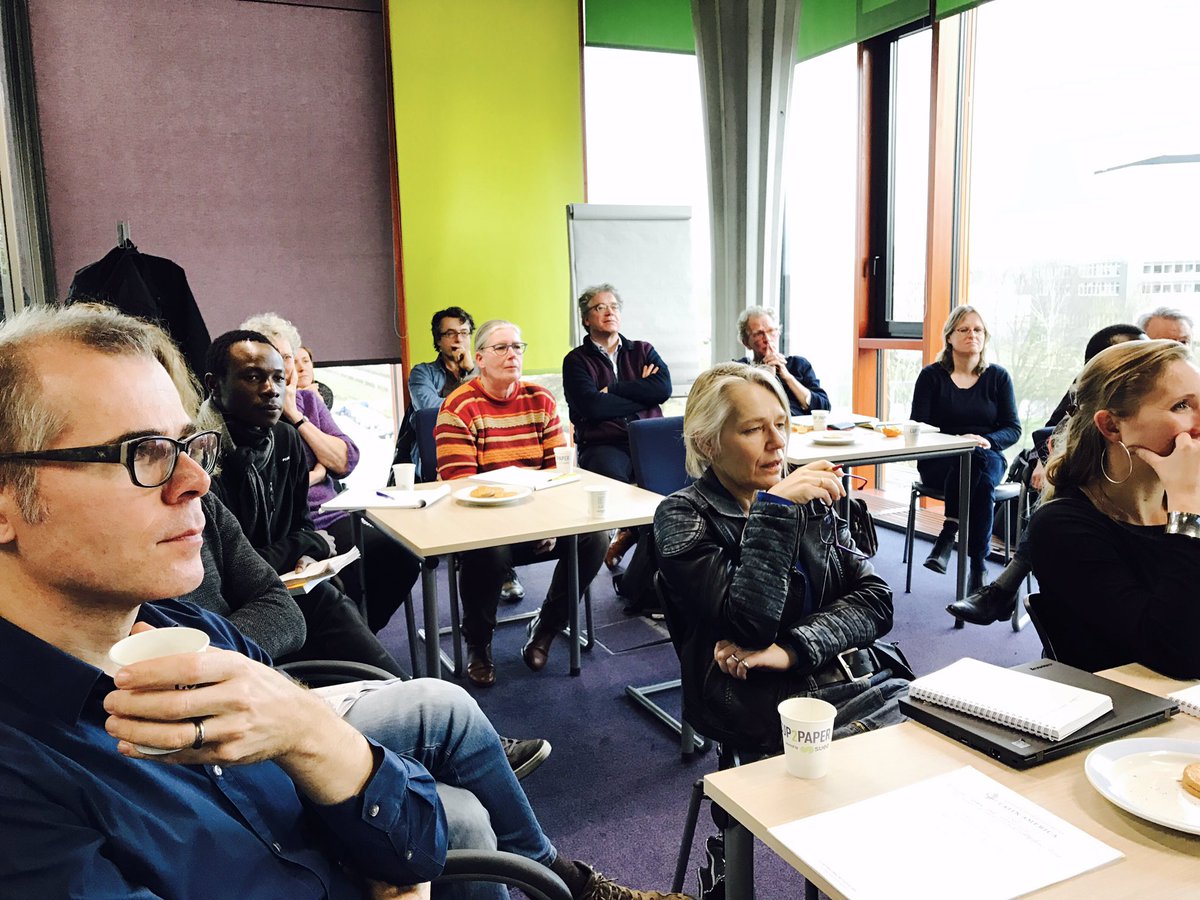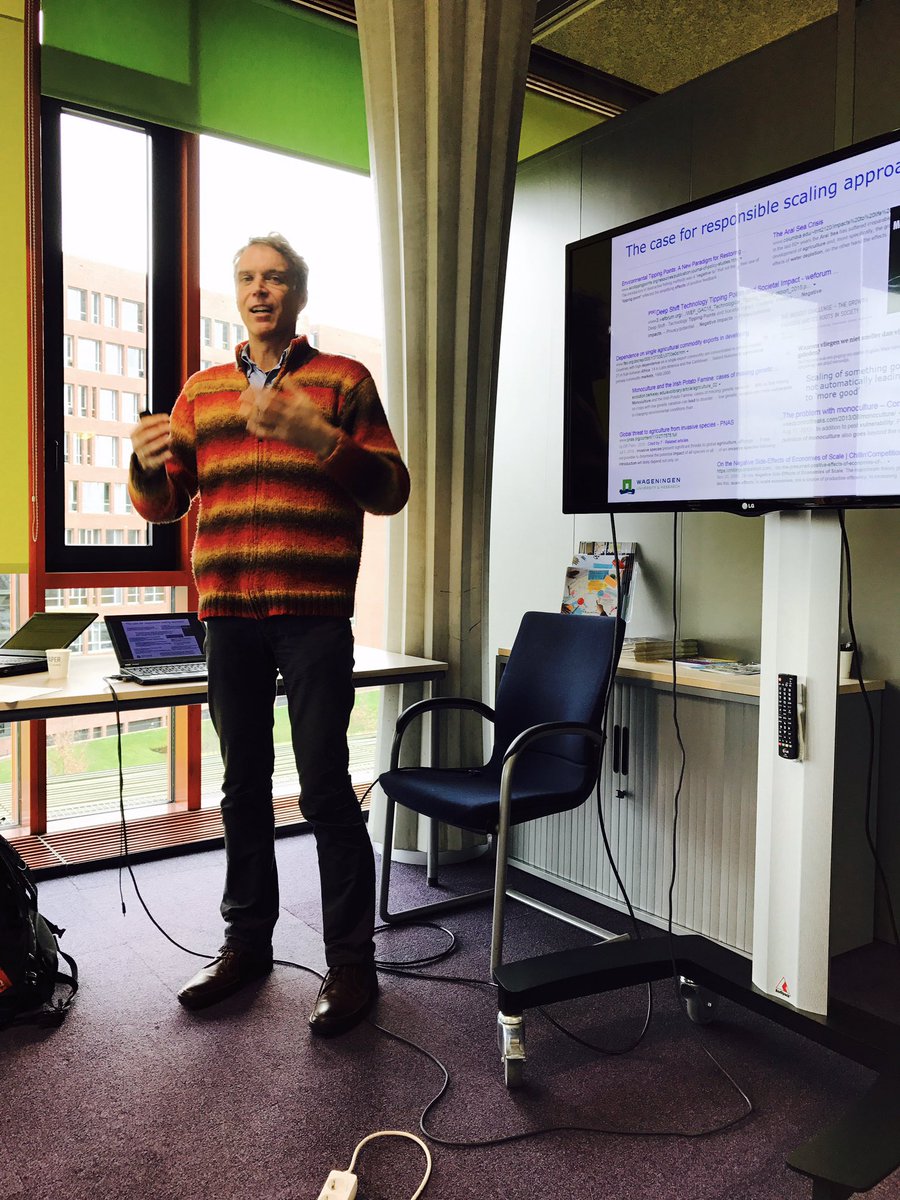1 March 2017. Seminar on novel perspectives on innovation and scaling - guiding decision making in AR4D.
Marc Schut and Seerp Wigboldus presented the main messages of their books.
Marc Schut just finalised a small book with guidelines on how to use innovation platforms effectively: Innovation Platforms in Agricultural Research for Development. A decision-support tool for research, development and funding agencies on how to design,
budget and implement successful innovation platforms.
Innovation Group (KTI), and Philosophy Group (PHI) of Wageningen University and
Research
This booklet is part of a series of legacy products of the CGIAR Research Program on Integrated Systems for the Humid Tropics (Humidtropics). It structures key findings from earlier research towards an approach that connects a theory of change perspective specifically to the question of ‘how scaling happens’.
Related:
Innovation platforms for agricultural development: Evaluating the mature innovation platforms landscape
Dror, I., Cadilhon, J.J., Schut, M., Misiko, M. and Maheshwari, S. 2016.
UK: Routledge.
Innovation Platforms (IPs) form the core of many Agricultural Research for Development programmes, stimulating multi-stakeholder collaboration and action towards the realization of agricultural development outcomes. This book enhances the body of knowledge of IPs by focusing on mature innovation platforms in agricultural systems research, including the crop and livestock sectors, and innovations in farmer co-operatives and agricultural extension services.
Marc Schut and Seerp Wigboldus presented the main messages of their books.
Marc Schut just finalised a small book with guidelines on how to use innovation platforms effectively: Innovation Platforms in Agricultural Research for Development. A decision-support tool for research, development and funding agencies on how to design,
budget and implement successful innovation platforms.
"Some time ago, I noticed that I was becoming increasingly annoyed with the Innovation Platform (IP) approach being opted as silver bullet solution in AR4D programs; especially for the sole purpose of disseminating (technological) agricultural innovations. I discussed this frustration with a number of colleagues working on IPs. Together, we decided to start working on some practical guidelines for project developers, implementers and donors" Marc Schut
Purpose:
- Reflect on whether innovation platforms are the most appropriate mechanism for resolving challenges related to the development of agricultural sectors and the well-being of communities within rural areas;
- Determine and adequately provide the resources and enabling conditions required for effective innovation platform implementation;
- Set realistic goals and objectives related to the innovation platform’s outcomes and how impact can be measured.
- It is part of a series of legacy products of the CGIAR Research Program on Integrated Systems for the Humid Tropics (Humidtropics).
- It structures key findings from earlier research supported by Humidtropics towards an approach that connects a theory of change perspective specifically to the question of ‘how scaling happens’.
- By doing so, it offers a way of thinking systemically and systematically about how scaling happens in the context of agrifood systems.
- This guide is a first step towards using a theory of change approach in the design, implementation, and evaluation of change initiatives that include a significant scaling ambition. Initial experiences were gained in research on scaling agroecological practice in Nicaragua, on scaling ‘green’ rubber in Southwest China, and on scaling the practice of cocoa farmer field schools in Cameroon
Related:
Wigboldus S, with Brouwers J (December 2016).
Wageningen Centre for Development Innovation (CDI), Knowledge, Technology and Innovation Group (KTI), and Philosophy Group (PHI) of Wageningen University and
Research
This booklet is part of a series of legacy products of the CGIAR Research Program on Integrated Systems for the Humid Tropics (Humidtropics). It structures key findings from earlier research towards an approach that connects a theory of change perspective specifically to the question of ‘how scaling happens’.
By doing so, it offers a way of thinking systemically and systematically about how scaling happens and could happen in the context of agrifood systems. Over the years, monitoring and evaluation (M&E) became so important that M&E experts were trained to support related processes. Scaling processes are both considered extremely important in the context of agrifood system innovation and relate to a multifaceted picture of dimensions and dynamics. Maybe it is therefore time to start training experts in the field of responsible scaling to advise and support scaling initiatives. If so, this booklet may provide initial ideas on how to strengthen capacity in this field through a curriculum along the lines of a Theory of Scaling.
Related:
Innovation platforms for agricultural development: Evaluating the mature innovation platforms landscape
Innovation Platforms (IPs) form the core of many Agricultural Research for Development programmes, stimulating multi-stakeholder collaboration and action towards the realization of agricultural development outcomes. This book enhances the body of knowledge of IPs by focusing on mature innovation platforms in agricultural systems research, including the crop and livestock sectors, and innovations in farmer co-operatives and agricultural extension services.
Resulting from an international IP case study competition, the examples reported will help the many actors involved with agricultural innovation platforms worldwide reflect on their actions and achievements (or failures), and find tools to share their experience.
Chapters feature case studies from Central Africa, Ethiopia, India, Kenya, Nicaragua and Uganda. Authors reflect critically on the impact of innovation platforms and showcase their progress, providing an important source book and inspiration for students, researchers and professionals.
Related:
Related:
- Hermans, F., Sartas, M., van Schagen, B., van Asten, P., and Schut, M. (2017). Social network analysis of multi-stakeholder platforms in agricultural research for development: Opportunities and constraints for innovation and scaling. March 2017, 22 pages
- Sartas, M., Schut, M. and Leeuwis, C. (2017). In press. Learning System for Agricultural Research for Development Interventions (LESARD) - Effective Documenting, Reporting and Analysis of Performance Factors in Multi-stakeholder Processes. In O. I. (Ed.), Integrated Systems Research for Sustainable Intensification of Smallholder Agriculture. Ibadan: Earthscan.
- Lisa Hiwasaki, Adrian Bolliger, Guillaume Lacombe, Jessica Raneri, Marc Schut and Steve Staal. 2016. Integrated Systems Research for Sustainable Smallholder Agriculture in the Central Mekong: Achievements and challenges of implementing integrated systems research. 160 pp.




No comments:
Post a Comment